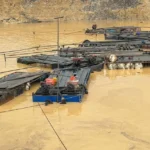
A political scientist at the University for Development Studies (UDS), Dr Alidu Bukari Gbensuglo, says Ghana’s deepening water crisis and the escalating costs of treatment are the direct consequences of years of recklessness, poor leadership, and unchecked greed.
Speaking on the AM Show on Tuesday, Dr Gbensuglo described the country’s worsening water pollution from illegal mining (galamsey) as a self-inflicted wound that keeps draining public resources.
“We are just paying the price for recklessness, poor leadership, and greed,” he said. “How did we arrive here? We need, as citizens, to support leadership to reorient and rethink the way we do things. Otherwise, we will keep borrowing to solve the same problems over and over again.”
His comments follow alarming revelations by the Managing Director of Ghana Water Limited (GWL), Adam Mutawakilu, who warned that continuing galamsey activities threaten to cripple water production and impose cascading economic costs across industries.
At a press conference in Accra on Monday, October 20, Mr Mutawakilu disclosed that GWL urgently needs GH₵300 million to desilt heavily polluted water bodies feeding treatment plants nationwide. He cautioned that if the trend continues, Ghana could face severe water shortages in the near future.
“The rivers feeding our major treatment plants have become so clogged with silt that pumps are submerged or lying in sludge,” he said. Last year alone, the company spent GH₵64 million dredging Owabi and another GH₵13.8 million at Mampong—unplanned expenditures triggered by worsening pollution levels.
Dr Gbensuglo noted that while government leadership is critical in addressing the galamsey menace, citizens must also take responsibility for supporting sustainable environmental practices.
“Yes, the galamsey problem is one of the biggest challenges on our hands now,” he added. “If this government can fight it successfully, it will be good for them. But beyond politics, we need a collective effort from everyone.”
Environmental experts have long warned that illegal mining is contaminating Ghana’s major rivers, including the Pra, Ankobra, Offin, and Birim, with mercury and heavy metals, forcing the state to spend millions on water treatment.
Dr Gbensuglo stressed that without a national reorientation in values and accountability, “we will keep recycling the same mistakes, paying heavily for our own negligence.”